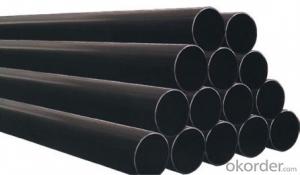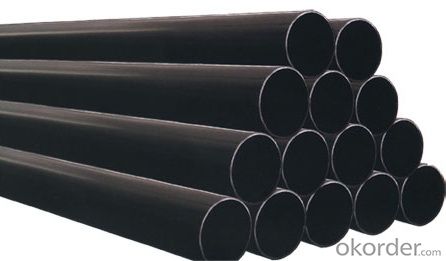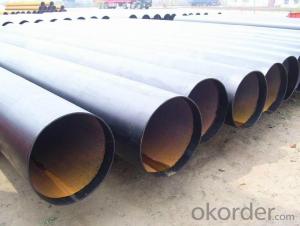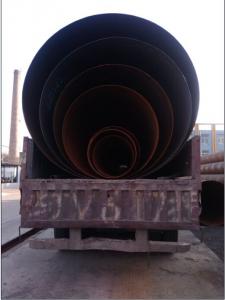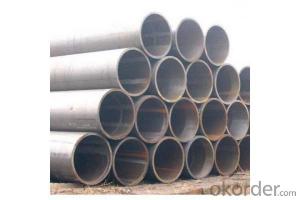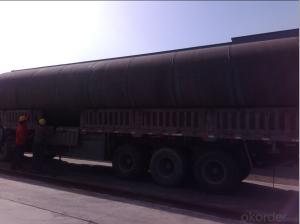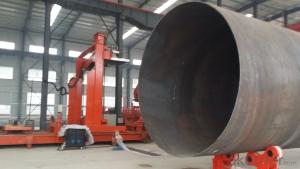26‘' CARBON STEEL SSAW WELDED PIPE API/ASTM/JIS/DIN
- Loading Port:
- Tianjin
- Payment Terms:
- TT OR LC
- Min Order Qty:
- 5 m.t
- Supply Capability:
- 300 m.t/month
OKorder Service Pledge
OKorder Financial Service
You Might Also Like
Packaging & Delivery
Packaging Detail: | standard export packing or as customer's requirement |
Delivery Detail: | within 10 - 30 days |
Specifications
Spiral Welded Steel Pipes and Tubes
1.Material:Q195-Q235
2.Length:1-12m
3.WT:1.0-14mm
4.O.D.:20-273mm
Product Description:
1.Material : Q235,Q345,L245,L290,L360,L415,L450,L485,GrB,X42,46,X52,X56,X60,X65,X70,X80,X100
2,Standard: SY/T5037-2000,GB/T9711-2011,API Spec 5L PSL1/PSL2,ASTM A252\A53,ISO3183,DIN17172,EN10217,JIS G3457,AWWA C200,ASTM A139,ASTM A671,ASTM A672
3.Wall thickness: 3.0mm-30mm
4.Outer diameter: φ168mm-3020mm
5,Length: 5m-12m or as your requirement
6,Corrosion protection standard: DIN30670,DIN30671, AWWAC210, AWWA C203, SY/T0413-2002,SY/T0414-2002
7,Application: Oil, gas, natural gas, water pipe, thermal electricity pipe, steel structure engineering, etc
Q195-q345 Material Steel Pipe's Materials
Elements | Chemical Compsition% | Mechanical Property | ||||||
C% | Mn% | S% | P% | Si% | Yield Point (Mpa) | Tensile Strength(Mpa) | Elongation | |
Q195 | 0.06-0.12 | 0.25-0.50 | <0.050< span=""> | <0.045< span=""> | <0.030< span=""> | >195 | 315-430 | 32-33 |
Q215 | 0.09-0.15 | 0.25-0.55 | <0.05< span=""> | <0.045< span=""> | <0.030< span=""> | >215 | 335-450 | 26-31 |
Q235 | 0.12-0.20 | 0.30-0.70 | <0.045< span=""> | <0.045< span=""> | <0.030< span=""> | >235 | 375-500 | 24-26 |
Q345 | <0.20< span=""> | 1.0-1.6 | <0.040< span=""> | <0.040< span=""> | <0.55< span=""> | >345 | 470-630 | 21-22 |
Packaging & Delivery
Packaging Detail: | Normal exporting packing,in container or bulk vessel or as per clients' request |
Delivery Detail: | 2 months after confimed contract |
Specifications
Large Diameter API 5L X70 PSL2 LSAW Steel Pipe
Grade: X42, X46, X50, X52, X60, B, C
OD: 1.5"-28"
WT: SCH10-SCH160
Brand:TPCO
Large Diameter API 5L X70 PSL2 LSAW Steel Pipe
Specifications:
u Standard: API 5L
u Grade: B, C, X42, X46, X50, X52, X56, X60, X65, X70, X80
u OD: 1.5"-28"
u WT: SCH10-SCH160
u Length: 5-12m
u Ends Finish: plain end, bevel end, grooved end
u Surface Treatment: bare, black varnished, oiled finish, red color, anti-corrosion, 3PE, FBE or epoxy coating
u Technique: hot rolled or cold drawn
u Application: api 5l steel pipe for conveying oil, water, gas
u Invoicing: based on theoretical weight or actual weight
u Payment Terms: L/C at sight, T/T or Western Union
u Trade Terms: FOB, CFR, CIF
u Certification: ABS manufacturing assessment, ABS design assessment, API 5CT, API 5L, DNV manufacturer certificate, ISO9001 quality management system certificate, ISO14001 environment management system certificate, GB/T28001 occupational health and safety management system certificate, A1 class manufacturing license of special equipment certificate, CCS, GL, LR, SGS, TüV, PDE
- Q: Can steel pipes be used for underground sewerage systems?
- Yes, steel pipes can be used for underground sewerage systems. Steel pipes are strong and durable, making them suitable for carrying sewage underground. They have a high resistance to corrosion and can withstand the pressure and load of the ground above. Steel pipes also have a long lifespan and are resistant to environmental factors such as moisture, chemicals, and temperature fluctuations. Additionally, steel pipes can be easily welded, making installation and repairs more convenient. However, it is important to ensure that the steel pipes are properly coated or lined to prevent corrosion and to comply with local regulations and standards for underground sewerage systems.
- Q: Can steel pipes be used for scaffolding?
- Yes, steel pipes can be used for scaffolding. Steel pipes are commonly used in scaffolding due to their strength, durability, and ability to support heavy loads. They provide a stable and secure structure for workers to access elevated areas during construction or maintenance projects.
- Q: Are steel pipes suitable for use in chemical plants?
- Yes, steel pipes are suitable for use in chemical plants. Steel pipes offer excellent resistance to corrosion, high durability, and can withstand high temperatures and pressures commonly found in chemical processing. Additionally, steel pipes can be easily welded, making them versatile for various chemical applications.
- Q: What are the different methods of non-destructive testing for steel pipes?
- The different methods of non-destructive testing for steel pipes include visual inspection, ultrasonic testing, magnetic particle testing, liquid penetrant testing, and radiographic testing. These methods are used to detect defects or abnormalities in the pipes without causing any damage. Visual inspection involves a thorough visual examination of the pipe's surface. Ultrasonic testing uses high-frequency sound waves to identify internal flaws or thickness measurements. Magnetic particle testing detects surface and near-surface defects by applying a magnetic field and inspecting for magnetic particles. Liquid penetrant testing involves applying a liquid dye to the surface and inspecting for any visible indications of defects. Radiographic testing uses X-rays or gamma rays to capture images that reveal internal defects or flaws in the steel pipes.
- Q: How big is the seamless steel tube of DN50?
- DN refers to the nominal diameter, the outer diameter is 60.3mm
- Q: How are steel pipes used in high-rise buildings?
- Steel pipes are used in high-rise buildings for various purposes, including structural support, water supply, and sewage disposal. They are commonly used as columns and beams to provide strength and stability to the building's framework. Additionally, steel pipes are utilized for plumbing systems, carrying water from the ground floor to the upper levels, as well as facilitating the disposal of wastewater. Overall, steel pipes play a crucial role in ensuring the safety and functionality of high-rise buildings.
- Q: How are steel pipes measured and categorized?
- Typically, steel pipes are measured and categorized by their outer diameter, wall thickness, and length. The outer diameter represents the width of the pipe when viewed from the side, while the wall thickness refers to how thick the pipe's walls are. These measurements are usually given in millimeters or inches. Categorizing steel pipes is done based on their purpose and specifications. The most common way to categorize them is by their pressure rating, which determines their ability to handle different levels of internal or external pressure. Pipes are divided into different pressure classes, like Schedule 40, Schedule 80, and Schedule 160, to name a few. The higher the pressure class, the thicker and stronger the pipe is. Steel pipes can also be categorized according to their manufacturing process and material composition. For instance, seamless steel pipes are created by piercing a solid steel bar to create a hollow tube, while welded steel pipes are made by rolling and welding a flat steel sheet or strip into a cylindrical shape. Additionally, steel pipes can be classified based on their material composition, such as carbon steel pipes, stainless steel pipes, or alloy steel pipes. Another way to categorize steel pipes is by their end connections or fittings. Common types of pipe ends include threaded ends, which are suitable for attaching fittings by screwing them onto the pipe, and plain ends, which are typically used for welding or flanging connections. In conclusion, the measurement and categorization of steel pipes are crucial for ensuring the proper selection and usage of these pipes in various industries, including construction, oil and gas, plumbing, and manufacturing.
- Q: Can steel pipes be used for wastewater treatment facilities?
- Yes, steel pipes can be used for wastewater treatment facilities. Steel pipes are commonly used in wastewater treatment plants due to their durability, resistance to corrosion, and ability to withstand high pressures and temperatures. They are suitable for transporting various types of wastewater, including industrial effluents and sewage, making them an ideal choice for such facilities.
- Q: What is the lifespan of steel pipes?
- The lifespan of steel pipes can vary depending on various factors such as the quality of the steel used, the environment in which they are installed, and the maintenance and care they receive. However, typically, steel pipes can last for several decades or even up to a century if properly installed and maintained.
- Q: Are steel pipes resistant to UV degradation?
- In general, steel pipes lack resistance to UV degradation. When exposed to ultraviolet (UV) radiation for extended periods, steel pipes may experience different types of degradation. The steel can become prone to brittleness, resulting in cracks and potential failure. Moreover, UV radiation can induce corrosion and discoloration on the surface of the steel pipes. To counteract the effects of UV degradation, it is possible to apply protective coatings or paint to create a barrier against UV radiation. Regular maintenance and inspections are crucial to detect any indications of UV degradation and implement necessary actions to prevent further deterioration.
Send your message to us
26‘' CARBON STEEL SSAW WELDED PIPE API/ASTM/JIS/DIN
- Loading Port:
- Tianjin
- Payment Terms:
- TT OR LC
- Min Order Qty:
- 5 m.t
- Supply Capability:
- 300 m.t/month
OKorder Service Pledge
OKorder Financial Service
Similar products
Hot products
Hot Searches
Related keywords
